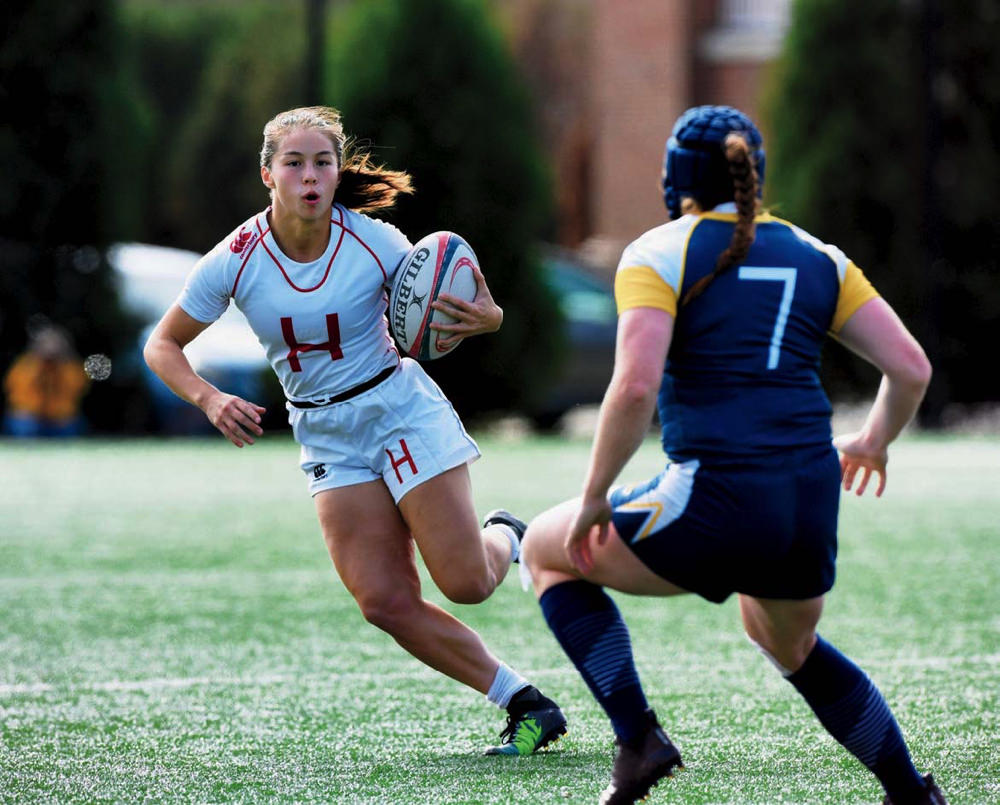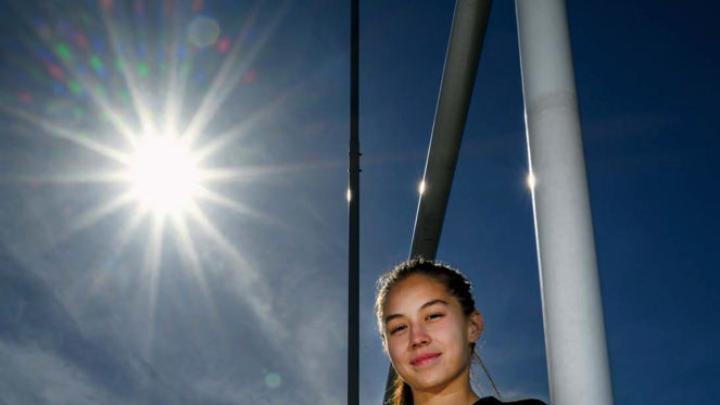Before she discovered rugby, with its tackles and breakdowns and wild chasing sprints, Sofie Fella ’22 was a dancer and a soccer player. She liked both, but neither quite fit. Her ballet instructors kept nagging that her arms and legs were too muscular; and on the soccer field, she was always the teammate getting called for fouls (“And I would be like, ‘What? Are you kidding me?’”). Then one day, during her first year of high school, her gym teachers suggested she try out for rugby.
She loved it immediately. Everywhere, there was freedom. With the ball in her hands instead of at her feet, she could run unrestricted, as fast as possible, in any direction. And collisions with opponents weren’t fouls; they were a foundational part of the game. And there was another kind of liberation, too: in many sports, the ceiling of achievement is capped by an athlete’s biology or body shape or innate talent. “But for rugby,” she says, “because you’re basically either holding the ball and running or running after someone and tackling them, it feels like the harder you work, the better you get. That relationship was so clear to me. More than, for example, in dance, where it felt like no matter how hard I worked, my body just wasn’t right.”
Fella joined the rugby team during her sophomore year at the American School in Shanghai, China, the city where she grew up. Soon she began spending summers at rugby camps and tournaments in the United States: Stanford, Seattle, Utah, Las Vegas, Little Rock. She was named MVP of her high-school team two years in a row, served as captain in her junior and senior years, and played on the under-18 national team for Germany, her father’s home country.
Then last fall, she arrived at Harvard, joining a team on a rising trajectory. At five-foot-five, Fella plays wing and fullback, two positions that require speed, patience, the strength to stay on one’s feet, and an alert awareness of the entire field and what might happen next. The ability to shift an opponent and outmaneuver her one-on-one is important. Wings are usually the team’s top scorers, moving the ball downfield and grounding it within the opponents’ in-goal area for a “try,” worth five points. Fullbacks are the last line of defense against an advancing opponent. “Sophie’s one of our speedsters,” says head coach Mel Denham. “She’s a stepper, very evasive. She’s great in the open field. She’s a finisher.”
Denham recalls an “incredible, try-saving tackle” Fella made in a home game against Quinnipiac last fall. Late in the first half, with the score tied at 7, a Quinnipiac wing had broken away from the pack, slipping through a gap between defenders and blazing across midfield with the ball. For a moment she seemed to have everyone beaten, with nothing but grass and the goal line in front of her, but then from the edge of the field, Fella appeared, closing in like an arrow. She wrapped her arms around the ball-carrier’s waist and pulled her to the ground. “There’s so much pressure on that fullback position to have to make that tackle,” Denham says. “It’s a really hard position to be in, and she just nails the tackle every time.”

Fella sprints toward a Quinnipiac defender during a contest last October in which she made a try-saving tackle and scored her fourth try in as many games.
Photograph by Gil Talbot/Harvard Athletics Communcations
Fella remembers that game too, though the play that sticks in her mind came a few minutes later, with the second half barely under way and Harvard advancing down the field. A series of passes found Fella at the far end of the formation with room to run. Just when she caught the ball, a hole opened in the opposing team’s defensive line, and Fella sailed through it, sprinting to the in-goal line just ahead of a tackle, one of six tries she made this season. “That’s probably my favorite try that I’ve ever scored, because it was such a team effort,” she says. “It’s impressive when an individual player runs through a bunch of people and scores, but this was even better, because it was like everybody touched the ball before it got to me, and that’s how I managed to get that open space. So that’s the clip we watch all the time. It’s on my desktop.”
Denham says pride and comradeship run deep on this team. “They play for each other, and they play for those who came before them.” Women’s rugby began as a Radcliffe club team in 1982, growing quickly from four players to more than 40; in 2013 it was elevated to a varsity sport. Each season now consists of two distinct units: during the fall season, called 15s, the squad plays weekly 80-minute games with 15 players to a side. In the spring, they play 7s: 14-minute games with seven players to a side. Instead of weekly match-ups, the 7s season is organized into a series of monthly tournaments, in which teams play four or five games each during the course of a day.
That first season after the transition to varsity was short—there were only a few other varsity squads for the Harvard women to play against—but the Crimson won the Ivy League title. Since then, the sport has grown, and so has the number of varsity opponents. Denham arrived in 2017, a former flanker for the U.S. national team, who’d been an assistant during Radcliffe rugby club days, and under her, Harvard has been evolving into a serious national contender. Last season, Harvard upset perennial rival Dartmouth to win the Ivy League championship, in a late October game under miserable conditions: freezing rain, mud everywhere, the ball slipping from players’ grasp. It was so cold that Fella’s hands went numb; she couldn’t tell if she was catching the ball. At halftime, she wedged a pair of hand-warmers into her sports bra so she could tuck her fingers next to them. “It didn’t really work.” It didn’t matter; they won the game. “That was the worst weather I’ve ever experienced,” Fella says. And then a beat later: “It was really fun.”
Fella is only one of several international players on the roster: other teammates come from Australia, Honduras, Germany, Canada, Scotland, and Hong Kong. Fella’s parents met as college students in Shanghai. Her father, from a small town outside Frankfurt, was in China as a foreign-exchange student learning Chinese; her mother was a Shanghai native who’d been taking German lessons. “Sometimes we joke around that we speak ‘Chinglisherman’ at home,” she says, in the American accent she picked up from classmates at the American School, which she attended from kindergarten onward.
At practice on a chilly, rainy spring afternoon, two weeks ahead of the 7s national tournament in late May (from which the Crimson would return with a bronze medal), the team was cycling through a series of set plays—passing drills, scrums, line-outs. Again and again, Fella lined up with her teammates, running forward and calling for a pass, sidestepping tackles, shoveling the ball toward the next player when defenders closed in. On the sidelines, she practiced lunging into a scrum with assistant coach Justin Moss, locking her shoulder into his over and over. She had only recently come back from injury—an ankle sprain that kept her out for all of April—and she seemed to be making up for lost time, or lost intensity. “Rugby is a sport where you know you’re going to get injured,” she says. “It’s something you have to expect. If not a big injury, then bruises or a pulled muscle somewhere that’s going to hurt. That doesn’t bother me.” The hardest part of rugby, she says, “is when you’re not playing.”








